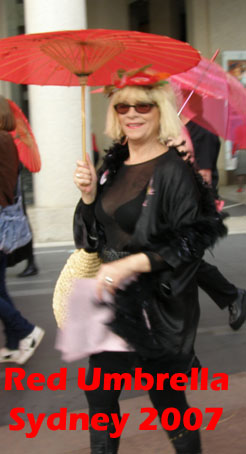Slut Walk Speech 2012
Download this speech as a PDF in a new window here

Hi, I'm Jane Green speaking on behalf of:
- Vixen Collective (1), Victoria's peer only (2) sex worker organisation
- Scarlet Alliance (3), Australia's national peak sex worker organisation.

I am, & have been for more than a decade, a sex worker, performer, sex worker activist, queer & general trouble-maker.
I am also a survivor of rape.
The problem with being a sex worker & survivor of rape is that blame & victim hood are inescapable.
Let me elaborate on that for you.
First in terms of "victim hood"...
The logic of much conservative & radical feminist theory dictates that if you are a sex worker some trauma - often assumed to be - your terrible childhood or past sexual assault - must have thrown you into a state where you are incapable of making rational decisions about your own needs, desires & life choices. Most specifically your choice of occupation.
This gives other people (particularly a certain type of academic) the right to inform you of your lack of agency, that what you believe to be your chosen path in life is simply "false consciousness" (4).
Now I don't like the idea of being a VICTIM, but I'll tell you what I like even less - other people telling me I'm not allowed to be anything else, because I'm a sex worker...
So here are some contrasting facts from my life for you.
Because it is not okay to blame the survivor of a rape.
Regardless of the survivors occupation.
I was raped at the age of six by a family friend.
When I was a child I never told anyone because of fear.
I kept the secret of my rape for years.
This is the first time I have spoken publicly of it.
This is a fact of my life.
It is not a pleasant fact.
But it no more contributed to my being a sex worker than it contributed to the fact that I also used to work as an accountant.
Sex workers who have been raped suffer the same trauma & pain as other rape survivors, but do so in a society that repeatedly tells them:
- their pain is an occupational hazard,
- blame them for choosing that occupation,
- then tell them they lack the capacity to actually make that "choice". (5) That is the definition of adding insult to injury.
And that is what I mean by BLAME.
& let me tell you something else...
- I really hated being an accountant.
- I really LOVE being a sex worker. It's not boring. I don't usually have to wear a suit & if I do I have cooler suits than I had when I was an Accountant.
- I get to enjoy sex & kink & people in way I never thought I would growing up. But I do & sex work helped me with that.
But let's get back to BLAME.
When a sex worker says they LOVE their job - they get blamed for that too. Abolitionists & critics like to say "well you're just a happy hooker", expecting and implying that you're coming from some sort of privilege or pro-sex platform & have nothing in common with "the majority" of sex workers. Well here are some more facts from my life, for you:
- I have spent more than 5 years of my life homeless,
- I have worked in street sex work,
- I have worked in criminalized environments,
- I have been raped at work.
- Rape is not a bad day at work.
- Rape should not be acceptable in the sex industry.
- Because rape should not be acceptable in ANY industry or workplace.
What enables enduring risk to the heath & safety of sex workers here in Australia is
- the willingness of the government to continue to refuse to extend to sex workers the same basic protections & dignities under law that average citizens take for granted.(6)
What sustains that risk is the willingness of the public to do nothing when sex workers raise their voices relentlessly asking for change. Here are some final facts for you...
- I happen to love my job.
- Not all sex workers do.
- Just like not all accountants do.
- & I don't claim to speak for all sex workers - because no-one can.
Sex workers are a diverse community of individuals - with individual voices who can speak to the truth of their own experiences & who do not want to be silenced.
And that's the problem:
- when sex workers are caricatured as victims & blamed,
- whether they remain within their sanctioned role as victim or express their agency - they are blamed & silenced, and the space & freedom they have as individuals & as a community is reduced.(7)
When studies conclude that sex workers across Australia have better sexual health & practice safer sex than the general population, but are subject in Victoria to forced invasive monthly health examinations to be able to work - that is an invasion not only against sex workers rights but also our bodies. (8)
When police are used as the enforcement arm of discriminatory laws against sex workers - as they are in Victoria - how can we trust & rely on them to protect us when we are the victims of crime?(9)
Abolitionists & proponents of the Swedish or Nordic Model - would try to sell you the concept that sex work needs to be criminalized to "protect" sex workers:
- how am I protected by laws that would deny me the ability to work safely? (10)
- how am I protected by having less rights than you?
- how are sex workers protected by being told what we need, rather than asked what we want?
& what do I, as a sex worker want?
I want the same rights - labour rights, human rights - as everyone else...
Seem fair?
Seem reasonable?
It's called DECRIMINALISATION
It has nothing to do with being a victim.
It has nothing to do with blame.
& everything to do with progress.

- Vixen Collective: refer http://vixencollective.blogspot.com.au/ for more information.
- Peer Only: the term "peer only" refers to the fact that Vixen Collection is a organisation composed entirely of past or present sex workers. Scarlet Alliance is also a peer only organisation.
- Scarlet Alliance: refer https://www.scarletalliance.org.au/ for more information.
- False Consciousness: at it's most basic definition, the idea that you are unable to see things as they really are. From a more classic Marxist interpretation – applied to sex workers - the control exerted by society via capitalism & patriarchy that leaves a sex worker unable to develop an understanding of the nature of their own oppression.
- “In contrast to the destructive stereotype that sex workers should for some reason expect sexual violence in the course of their work, or are less traumatised by sexual assault, research with sex workers makes clear that sexual assault is experienced as intensely traumatic … Sex workers' experiences of violence show that for some workers, sexual assault is more likely to happen than for the general population - yet they are least likely to report sexual assault to police.” Sex workers and sexual assault in Australia: Prevalence, risk and safety, Dr Antonia Quadara, section – ‘Barriers to disclosure & accessing support’ http://www.aifs.gov.au/acssa/pubs/issue/i8.html
- “An argument advanced for the failure to adequately reform sex industry regulations to ensure that sex workers have occupational conditions enjoyed by other service industries is that sex work is inherently exploitative and harmful to those who work in the sex industry. However, little consideration is given to how laws regulating the sex industry create the conditions for the exploitation of sex workers and contribute to the social and psychological harm of sex workers.” Unjust and Counter-Productive: The Failure of Governments to Protect Sex Workers From Discrimination, Linda Banach & Sue Metzenrath, page 6. https://www.scarletalliance.org.au/library/unjust-counterproductive
- On the sanctioned role of sex worker as victim: “This is what we call feminist attachment to “tragedy porn”: A desire in the feminist movement to hear, and enjoy hearing, tragic stories of hardship from sex workers. When we don’t tell them, we face the accusation that we are covering up the “truth” about sex work… We are expected to perform stereotypical narratives of tragedy porn for feminist audiences and when we don’t we are disbelieved. Sex workers don’t want to be only believed when we perform these normative stereotypes about sex work. Why do you only believe a sex worker when they are telling you about a bad day at work, but have trouble believing a sex worker who tells you that decriminalisation and human rights will improve our workplaces, and increased regulation will not? The goal of the sex worker rights movement is to be heard for ourselves, to be self determined and to be recognised as politically autonomous.” Listen to sex workers: support decriminalisation and anti-discrimination protections, Elena Jeffreys, Audry Autonomy, Jane Green, Christian Vega (Scarlet Alliance Australian Sex Workers Association), Interface Journal, Vol 3 (2), page 279. http://www.interfacejournal.net/wordpress/wp-content/uploads/2011/12/Interface-3-2-Scarlet-Alliance.pdf
- “…condom use for vaginal and anal sex exceeds 99% and sexually transmissible infection rates are at historic lows. These gains are attributable to the long-term support of the NSW Department of Health in collaboration with the community-based Sex Workers Outreach Project and sexual health services, facilitated by the removal of criminal sanctions without the expense and access barriers of licensing systems.” Improving the health of sex workers in NSW: maintaining success, Basil Donovan, Christine Harcourt, Sandra Egger Christopher K. Fairley, 2010. http://docs.docstoc.com/pdf/3413405/a44f79e5-996e-41bc-aea0-bc3f93434301.pdf “…over 99% of all commercial vaginal sex encounters in Sydney involve the use of a condom.” Contrasted with Victoria, NSW currently is decriminalized and has no legislative requirement for either STI tests or condom use (just as neither are required in private sexual encounters): The Sex Industry in New South Wales: A Report to the NSW Ministry of Health, Basil Donovan, Christine Harcourt, Lucy Watchirs Smith, Karen Schneider, Handan Wand, John M Kaldor, Marcus Y Chen, Christopher K Fairley, Sepehr Tabrizi, 2012, page 24. http://www.med.unsw.edu.au/nchecrweb.nsf/resources/SHPReport/$file/NSWSexIndustryReportV4.pdf
- “…police have extensive powers over sex workers through legislation ... In such contexts sex workers cannot rely on police for assistance after they have been sexually assaulted; instead they are likely to receive penalties and fines for doing so. It also means that under such circumstances sex workers are less likely to seek support from other sectors such as social work, since it cannot be guaranteed that they are not police or do not have contact with them.” Sex workers and sexual assault in Australia: Prevalence, risk and safety, Dr Antonia Quadara, section – "Relationship with police" http://www.aifs.gov.au/acssa/pubs/issue/i8.html
- “The new law which prohibits the act of buying sexual services is severely criticized by sex workers. They find the law paradoxical, illogical and discriminatory. It further obstructs their work and exposes them to stress and danger… How can the politicians claim that only the clients are being punished and that they are being protected? … As a result of the new legislation, the sex workers say it is now harder for them to assess the clients. The clients are more stressed and scared and negotiation outdoors must be done in a more rapid manner. The likelihood of ending up with a dangerous client is thereby greater… Another consequence is that the sex workers are now more apprehensive about seeking help from the police when they have had problems with an abusive customer. They do not want to be forced to report the client.” Sex Workers Critique of Swedish Prostitution Policy, Petra Ostergren. http://www.petraostergren.com/pages.aspx?r_id=40716
